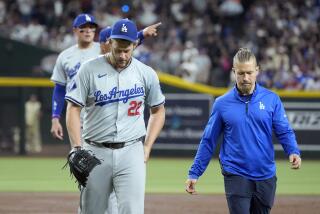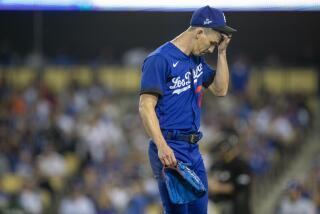COPING : Some Days Are Good and Some Days Are Bad but Any Day That Revolves Around Dodger Baseball Is Still His Favorite
Throughout the Dodger Stadium season, one day is like another for Roy (Campy) Campanella.
“My attendant (Perry Nicholas) comes in about 2 p.m. and prepares me to get up,” Campanella said.
“He bathes me, dresses me, and puts me in the wheelchair.”
The former Dodger catcher was paralyzed in a 1958 auto accident.
“I only have two ways to go now--the bed and the wheelchair,” he said. “And there’s one good thing about lying down. If I sit up too long, it’s detrimental to my buttocks.”
By 2 p.m., Campanella, who lives with his wife Roxie in Woodland Hills, has sometimes had breakfast in bed.
“I’d rather sit up (in the wheelchair) for my meals,” he says. “When I’m in bed, someone has to feed me. If I’m sitting up, I can feed myself, and that makes me feel more independent.”
On game days, he arrives early at Dodger Stadium and has dinner there.
“If we’re entertaining guests, we usually go to the Stadium Club, otherwise the press dining room,” he says. “I like the menu--but I watch my weight and stay away from gravies and sweets. I don’t have to weigh myself because the doctor says if you feel healthy, you’re all right, and I agree with that.”
Once moon-faced and heavy, Campanella today is thin, drawn and clean cut but still soft spoken and perky. He wears a thin mustache that is always carefully tended.
At handshake time, making a particularly brave and disarming gesture, Campanella offers his hand in greeting and fellowship--even though he can no longer grip yours as he would like to.
He doesn’t want to embarrass anyone. But he wants you to know his limitations.
“I keep things simple,” he said. “There are things I can do and things I can’t do. I know and accept the difference--and I don’t overdo anything.”
Much of his time is spent in bed, where, he says, he reads some and watches some television but mostly listens to KABC, the Dodger station.
His baseball background and his continuing deep interest in the game have obviously been therapeutic.
“Like everybody else, I have good days and bad days.” he said. “But, most of them are good, and if I’m going to a game, I almost never have a bad day. Baseball does something for me.”
For one thing, it keeps him looking ahead.
“Campy has outlived his life expectancy by many years,” said Bill Shumard, director of Dodger community services. “It’s his cheerful outlook on life that does it.”
At the ballpark, like any other 63-year-old baseball fan, Campanella enjoys talking baseball with old friends.
“A lot of writers still know me, especially the writers from Cincinnati, St. Louis and Chicago,” he said. “I like being interviewed.”
Most of his Dodger Stadium hours are spent in the company of his wife, a good-natured, well groomed woman who married him three years after the accident.
They sit almost side by side on the stadium’s club level, Roxie in an aisle seat on the back row, Roy slightly behind but close by in his wheelchair.
From where he sits, he looks out over home plate. It is, as he says, a matchless view, similar to Peter O’Malley’s in the Dodger president’s box next door.
“I’m very grateful to Mr. O’Malley,” Campanella said. “He’s gone way out of his way to give me a good life.”
During the offseason--and occasionally in the summer when the club is on the road--Campanella makes speeches for the Dodgers as a member of their Community Services Dept.
“Campy always gets a standing ovation,” said his department head, Shumard.
“You wouldn’t know he never played a game in Los Angeles. He is received as if he’d spent his whole Hall of Fame career here. He speaks without notes, and they love the gentle, knowing way he expresses himself.”
Of the changes in his life style since the 1950s, when he was more active and more talented than all but a few other Americans, Campanella says only one thing was really tough.
“That’s the day I found out I was totally paralyzed, that I’d never again be able to do for myself--to help myself,” he said. “That’s pretty hard to take.”
He often thinks of what he calls the turning point in his 27-year battle to win--to cope.
“It was the first year,” he said. “I took stock one day and told myself: ‘Campy, this could have been a lot worse.’ ”
More to Read
Go beyond the scoreboard
Get the latest on L.A.'s teams in the daily Sports Report newsletter.
You may occasionally receive promotional content from the Los Angeles Times.










